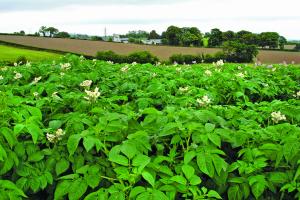AFBI science highlights innovative methods to control bacterial soft rot of vegetable crops
Date published:
A key feature of Northern Ireland’s potato industry is the export of high grade seed potatoes to several countries and the value of sales from the potato industry in Northern Ireland is approximately £20 million per year. However, as with other plant crops, the negative effect that pests and pathogens are having on plant health is increasing.

Bacterial soft rot is one such problem. Bacterial soft rot can cause significant damage to the quantity and quality of many important vegetables produced in NI including potatoes, onions and carrots. Whilst several years of official testing of potatoes in Northern Ireland has shown that the most serious of these soft rot pathogens are not present here, it is important to remain alert and to investigate novel strategies to reduce the risks of the disease. This is especially important as there are currently no viable ways to control soft rot in the field, and robust testing systems for seed crops, practicing good hygiene when planting, managing and harvesting are the only current ways to prevent the disease.
However a team of plant health scientists led by Dr Richard O’Hanlon at the Agri-Food and Biosciences Institute (AFBI) and Queens University Belfast funded by the Department of Agriculture, Environment and Rural Affairs (DAERA), have used a combination of lab, glasshouse and field trials to test the efficacy of naturally occurring bacteriophages (viruses of bacteria) to control bacterial soft rot of potatoes and onions. The research found that these bacteriophages could be combined to create a protective “cocktail” which when applied to the crops significantly reduced the amount of soft rot, and increased the number of plants surviving the disease. High-tech genomic analysis showed that some of these bacteriophages had genes involved in the destruction of bacterial cells, and so could likely infect and destroy pathogenic bacteria that come into contact with the plants.
The work highlights the natural environment as a reservoir of promising bacteriophages for biocontrol, hence reducing the need for chemical based solutions. Globally, there are estimated to be thousands of bacteriophages, of which many are highly host specific to certain bacteria. This high host specificity limits the negative effects the bacteriophages have on beneficial bacteria, making them ideal candidates for use in biocontrol of soft rot and other plant diseases. The AFBI bacteriophage cocktail purposely contained several different bacteriophages, to make the cocktail more robust against a wider range of bacteria and to protect against the development of bacterial resistance to the bacteriophages.
As a mark of its excellence, this work from AFBI has been published recently in the prestigious international scientific journals PLOS One, Viruses, and European Journal of Plant Pathology.
LINKS TO ARTICLES:
Zaczek-Moczydłowska, M.A., Fleming, C.C., Young, G.K., Campbell, K. and O’Hanlon, R., 2019. Pectobacterium and Dickeya species detected in vegetables in Northern Ireland. European Journal of Plant Pathology, 154: 635-647.
Zaczek-Moczydłowska, M.A., Young, G.K., Trudgett, J., Fleming, C.C., Campbell, K., O'Hanlon, R. (2020) Genomic Characterization, Formulation and Efficacy in Planta of a Siphoviridae and Podoviridae Protection Cocktail against the Bacterial Plant Pathogens Pectobacterium spp. Viruses, 12: 150. https://www.mdpi.com/1999-4915/12/2/150#
Zaczek-Moczydłowska, M.A., Young, G.K., Trudgett, J., Plahe, C., Fleming, C.C., Campbell, K., O'Hanlon, R. (2020) Phage cocktail containing Podoviridae and Myoviridae bacteriophages inhibits the growth of Pectobacterium spp. under in vitro and in vivo conditions. PLOS One. https://doi.org/10.1371/journal.pone.0230842 https://journals.plos.org/plosone/article?id=10.1371/journal.pone.0230842
Notes to editors:
AFBI is an arms-length body of DAERA delivering research and development, diagnostic and analytical testing, emergency response capability and expert scientific advice for DAERA and other government departments, public bodies and commercial companies in Northern Ireland, and further afield.AFBI’s Vision is “Advancing the Local and Global Agri-Food Sectors Through Scientific Excellence”.AFBI’s core areas:Leading improvements in the agri-food industry;Protecting animal, plant and human health;Enhancing the natural and marine environment.